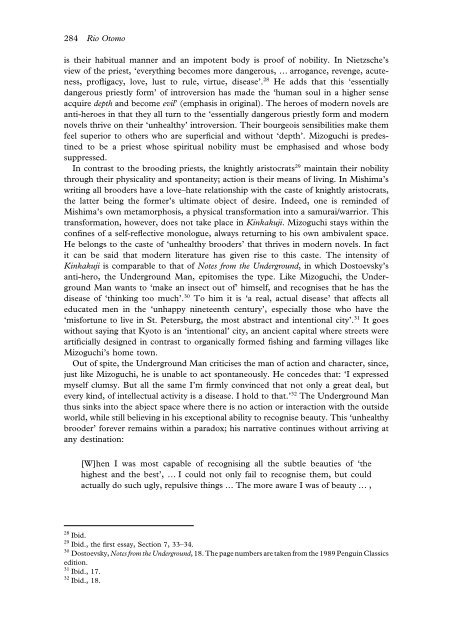A Manifestation of Modernity: The Split Gaze and the ... - Rio Otomo
A Manifestation of Modernity: The Split Gaze and the ... - Rio Otomo
A Manifestation of Modernity: The Split Gaze and the ... - Rio Otomo
You also want an ePaper? Increase the reach of your titles
YUMPU automatically turns print PDFs into web optimized ePapers that Google loves.
284 <strong>Rio</strong> <strong>Otomo</strong><br />
is <strong>the</strong>ir habitual manner <strong>and</strong> an impotent body is pro<strong>of</strong> <strong>of</strong> nobility. In Nietzsche’s<br />
view <strong>of</strong> <strong>the</strong> priest, ‘everything becomes more dangerous, … arrogance, revenge, acuteness,<br />
pr<strong>of</strong>ligacy, love, lust to rule, virtue, disease’. 28 He adds that this ‘essentially<br />
dangerous priestly form’ <strong>of</strong> introversion has made <strong>the</strong> ‘human soul in a higher sense<br />
acquire depth <strong>and</strong> become evil’ (emphasis in original). <strong>The</strong> heroes <strong>of</strong> modern novels are<br />
anti-heroes in that <strong>the</strong>y all turn to <strong>the</strong> ‘essentially dangerous priestly form <strong>and</strong> modern<br />
novels thrive on <strong>the</strong>ir ‘unhealthy’ introversion. <strong>The</strong>ir bourgeois sensibilities make <strong>the</strong>m<br />
feel superior to o<strong>the</strong>rs who are superficial <strong>and</strong> without ‘depth’. Mizoguchi is predestined<br />
to be a priest whose spiritual nobility must be emphasised <strong>and</strong> whose body<br />
suppressed.<br />
In contrast to <strong>the</strong> brooding priests, <strong>the</strong> knightly aristocrats 29 maintain <strong>the</strong>ir nobility<br />
through <strong>the</strong>ir physicality <strong>and</strong> spontaneity; action is <strong>the</strong>ir means <strong>of</strong> living. In Mishima’s<br />
writing all brooders have a love–hate relationship with <strong>the</strong> caste <strong>of</strong> knightly aristocrats,<br />
<strong>the</strong> latter being <strong>the</strong> former’s ultimate object <strong>of</strong> desire. Indeed, one is reminded <strong>of</strong><br />
Mishima’s own metamorphosis, a physical transformation into a samurai/warrior. This<br />
transformation, however, does not take place in Kinkakuji. Mizoguchi stays within <strong>the</strong><br />
confines <strong>of</strong> a self-reflective monologue, always returning to his own ambivalent space.<br />
He belongs to <strong>the</strong> caste <strong>of</strong> ‘unhealthy brooders’ that thrives in modern novels. In fact<br />
it can be said that modern literature has given rise to this caste. <strong>The</strong> intensity <strong>of</strong><br />
Kinkakuji is comparable to that <strong>of</strong> Notes from <strong>the</strong> Underground, inwhich Dostoevsky’s<br />
anti-hero, <strong>the</strong> Underground Man, epitomises <strong>the</strong> type. Like Mizoguchi, <strong>the</strong> Underground<br />
Man wants to ‘make an insect out <strong>of</strong>’ himself, <strong>and</strong> recognises that he has <strong>the</strong><br />
disease <strong>of</strong> ‘thinking too much’. 30 To him it is ‘a real, actual disease’ that affects all<br />
educated men in <strong>the</strong> ‘unhappy nineteenth century’, especially those who have <strong>the</strong><br />
‘misfortune to live in St. Petersburg, <strong>the</strong> most abstract <strong>and</strong> intentional city’. 31 It goes<br />
without saying that Kyoto is an ‘intentional’ city, an ancient capital where streets were<br />
artificially designed in contrast to organically formed fishing <strong>and</strong> farming villages like<br />
Mizoguchi’s home town.<br />
Out <strong>of</strong> spite, <strong>the</strong> Underground Man criticises <strong>the</strong> man <strong>of</strong> action <strong>and</strong> character, since,<br />
just like Mizoguchi, he is unable to act spontaneously. He concedes that: ‘I expressed<br />
myself clumsy. But all <strong>the</strong> same I’m firmly convinced that not only a great deal, but<br />
every kind, <strong>of</strong> intellectual activity is a disease. I hold to that.’ 32 <strong>The</strong> Underground Man<br />
thus sinks into <strong>the</strong> abject space where <strong>the</strong>re is no action or interaction with <strong>the</strong> outside<br />
world, while still believing in his exceptional ability to recognise beauty. This ‘unhealthy<br />
brooder’ forever remains within a paradox; his narrative continues without arriving at<br />
any destination:<br />
[W]hen I was most capable <strong>of</strong> recognising all <strong>the</strong> subtle beauties <strong>of</strong> ‘<strong>the</strong><br />
highest <strong>and</strong> <strong>the</strong> best’, … I could not only fail to recognise <strong>the</strong>m, but could<br />
actually do such ugly, repulsive things … <strong>The</strong> more aware I was <strong>of</strong> beauty … ,<br />
28<br />
Ibid.<br />
29<br />
Ibid., <strong>the</strong> first essay, Section 7, 33–34.<br />
30<br />
Dostoevsky, Notes from <strong>the</strong> Underground, 18. <strong>The</strong> page numbers are taken from <strong>the</strong> 1989 Penguin Classics<br />
edition.<br />
31<br />
Ibid., 17.<br />
32<br />
Ibid., 18.




